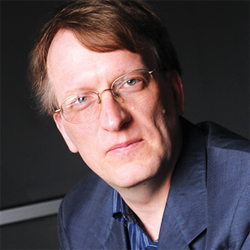Henning Schulzrinne, the Julian Clarence Levi Professor of Mathematical Methods and Computer Science at The Fu Foundation School of Engineering at Columbia University, has been named the recipient of the 2016 IEEE Internet Award for exceptional contributions to the advancement of Internet technology.
Schulzrinne was recognized “for formative contributions to the design and standardization of Internet multimedia protocols and applications.” Schulzrinne is particularly known for his contributions in developing the Session Initiation Protocol (SIP) and Real-Time Transport Protocol (RTP), the key protocols that enable Voice-over-IP (VoIP) and other multimedia applications. Each is now an Internet standard and together they have had an immense impact on telecommunications, both by greatly reducing consumer costs and by providing a flexible alternative to the traditional and expensive public-switched telephone network.
“This award also recognizes the work by my students and visitors in the Columbia IRT lab as well as all the other colleagues who contributed to making Internet-based multimedia possible,” says Schulzrinne, in referring to the Internet Real-Time (IRT) Lab, which he directs and which conducts research in the areas of Internet and multimedia services.
The Internet award follows on the heel of two other honors recently accorded Schulzrinne. In January, he was named an ACM Fellow, and in December 2014 he received an Outstanding Service Award by the Internet Technical Committee (ITC), of which he was the founding chair. In 2013, Schulzrinne was inducted into the Internet Hall of Fame. Other notable awards include the New York City Mayor’s Award for Excellence in Science and Technology and the VON Pioneer Award.
Schulzrinne whose research interests include applied network engineering, wireless networks, security, quality of service, and performance evaluation, continues to work on VoIP and other multimedia applications and is currently investigating an overall architecture for the Internet of Things and making it easier to diagnose network problems. He is also active in designing technology solutions to limit phone spam (“robocalls”) and recently testified on this topic before the Senate Special Committee on Aging.
In addition to his research, Schulzrinne is active in public policy and in serving the broader technology community. From 2012 until 2014, he was the Chief Technology Officer for the Federal Communications Committee where he guided the FCC’s work on technology and engineering issues and played a major role in the FCC’s decision to require mobile carriers to support customers’ abilities to contact 911 using text messages. He continues to serve as a technical advisor to the FCC.
Schulzrinne is a past member of the Board of Governors of the IEEE Communications Society and a current vice chair of ACM SIGCOMM. He has served on the editorial board of several key publications, chaired important conferences, and published more than 250 journal and conference papers and more than 86 Internet Requests for Comment.
Schulzrinne received his undergraduate degree in economics and electrical engineering from the Darmstadt University of Technology, Germany, his MSEE degree as a Fulbright scholar from the University of Cincinnati, Ohio and his PhD from the University of Massachusetts in Amherst, Massachusetts.
Posted 6/30/2015
-Linda Crane
Find open faculty positions here.


